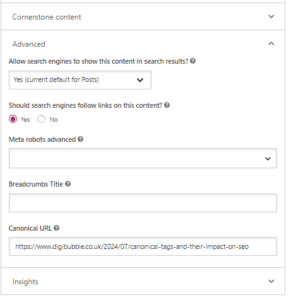When it comes to search engine optimisation (SEO), one of the critical factors that can…
Canonical Tags and Their Impact on SEO

In the world of SEO, every tiny detail matters, and understanding the role of canonical tags is no exception. These seemingly obscure tags can profoundly impact your website’s SEO performance, effectively making or breaking your visibility in the vast digital arena. But what exactly are they, how do you use them and why should or shouldn’t you use them to impact your SEO? We’ll discuss all this and more in this blog article.
What are Canonical Tags?
A canonical tag, or “rel=canonical”, is a simple piece of HTML code embedded in a webpage. They are used when you’re uploading duplicate, or very similar content from other sources onto you’re website. The canonical tags tell search engine bots which version of a duplicated or similar page should be considered the “master” or “preferred” version.
There are many different instances where you would be looking to use canonical tags. For example, if you’re having a popular blog post translated into several languages, hosted on different URLs. To a search engine, these appear as duplicate content, potentially leading to a lower page ranking. Here, a canonical tag will point the bot to the original version, thereby preserving your SEO rank.
There are also many subscription services that will provide you with a blog subscription each month, where you can take their content and directly upload it to your website. Sounds great, until they tell you to add a canonical tag back to their original content with each blog. Endorsing their own content and giving yours a lower SEO rank. These subscription services are great to make your site look active and knowledgeable about your sector, but do little for your own SEO. We always recommend adding your own unique blog content at least once a month, to ensure that you’re ranking for more keywords and improving your overall rank. You can still use these services to help boost the content going up on your website, but use it combined with your own original content for an SEO boost.
What is Their Impact on SEO?
The impact of canonical tags on SEO is significant and multifaceted. Let’s delve in to understand better.
- Preventing Duplicate Content Penalties: Canonical tags are like your website’s defence mechanism against duplicate content issue. They tell search engines that yes, you are aware of the duplicate content, but here is the original, the one that should be ranked. This way, your site avoids any potential penalties that can harm your SEO.
- Organizing Site Indexing: Canonical tags streamline site indexing by reducing the number of ‘unnecessary’ pages that search engine bots have to crawl and index. This optimization leads to a more efficient crawling process, making your website more appealing to search engines.
How to Implement Canonical Tags?
Implementing canonical tags involves adding a line of HTML code to the head section of each webpage.
The code looks something like this:
<link rel="canonical" href="https://www.yourwebsite.com/original-page" />
 This tells search engines that the page at the given URL (https://www.yourwebsite.com/original-page) is the master copy. If you’re using a CMS like WordPress, canonical tags can be managed through SEO plugins like Yoast SEO. These plugins can automatically generate and implement canonical tags, helping less tech-savvy users avoid the intricacies of manual coding.
This tells search engines that the page at the given URL (https://www.yourwebsite.com/original-page) is the master copy. If you’re using a CMS like WordPress, canonical tags can be managed through SEO plugins like Yoast SEO. These plugins can automatically generate and implement canonical tags, helping less tech-savvy users avoid the intricacies of manual coding.
In Yoast specifically, the canonical URL can be added under the “advanced” drop down on a website page.
Final Thoughts
In conclusion, canonical tags are powerful tool in the SEO toolkit. They help combat duplicate content issues and optimise site indexing. By understanding and correctly implementing them, you can make your website more appealing to search engines, ultimately boosting your site’s visibility and ranking. But remember that you don’t want too many of your pages/blogs being loaded with canonical tags. Focusing on new, unique content optimised for keywords is far better for your SEO.
Get in touch with DigiBubble, to see how we can help improve your SEO rank and get you found organically!



